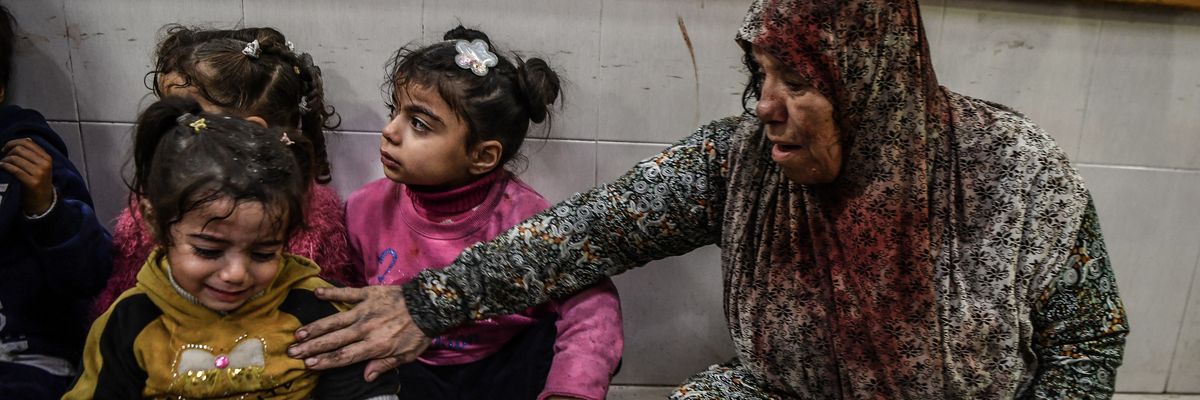Humanitarian groups and United Nations officials expressed horror Wednesday at the disaster unfolding in Gaza as Israeli forces stormed the largest city in the southern part of the strip, fueling concerns of a repeat of the appalling destruction that Israel inflicted in the north.
Volker Türk, the U.N.'s high commissioner for human rights, said at a press conference that the "catastrophic situation" in Gaza was "entirely foreseeable and preventable." He noted that his colleagues on the ground in the besieged strip "have described the situation as apocalyptic."
"Military operations, including bombardment, by Israeli forces continue in north, middle, and south Gaza, affecting people who have already been displaced multiple times—forced to flee—in search of safety," said Türk. "But no place is safe."
Many had fled to Khan Younis from the north in search of safety, only to be told to evacuate again weeks later as the Israeli military closed in.
The Israel Defense Forces (IDF) said earlier this week that its ground offensive now encompasses the entirety of the Gaza Strip, leaving the nearly 2 million people who have been displaced with no viable options to avoid near-constant Israeli bombing, shelling, and firefights that have prevented the delivery of critical aid, including medicine and food.
Virtually the entire population of Gaza is at imminent risk of starvation, the World Food Program has warned.
"The hunger war has started," one displaced person toldThe Associated Press, saying that Gazans are now fighting over dwindling food supplies. "This is the worst of all wars."
"Each day we see more dead children and new depths of suffering for the innocent people enduring this hell."
Jan Egeland, secretary-general of the Norwegian Refugee Council (NRC), said that tens of thousands of people are living on the streets of southern Gaza in makeshift and overcrowded shelters, heightening the risk of infectious disease. The United Nations Relief and Works Agency for Palestinian Refugees in the Near East reported an outbreak of Hepatitis A at one of its facilities last week.
Hospitals are also overwhelmed and out of basic supplies, forcing doctors to operate on wounded patients without anesthesia and proper sanitation.
"Many of my own NRC staff members now live on the streets. One of them does so with her two-month-old baby," said Egeland. "Our colleagues in Gaza ask themselves a simple question: How is it that these atrocities are beamed across the world for all to witness, and yet so little is done to stop them?"
Egeland called Israel's "pulverizing of Gaza" one of "the worst assaults on any civilian population in our time and age."
"Each day we see more dead children and new depths of suffering for the innocent people enduring this hell," he added, calling for an immediate cease-fire. "The situation in Gaza is a total failure of our shared humanity. The killing must stop."
Israel—whose assault has been backed politically and militarily by the U.S. and other Western nations—claims its intensifying attack on Khan Younis and other areas of southern Gaza is aimed at eliminating Hamas strongholds, an assertion it has used throughout the two-month war to justify the mass slaughter of civilians and the decimation of large swaths of the Palestinian territory.
The Euro-Mediterranean Human Rights Monitor, a Geneva-based nonprofit, estimated Tuesday that at least 90% of the Palestinians killed by Israeli forces since October 7 have been civilians, contradicting Israel's claim that two Gaza civilians have been killed for every Hamas combatant.
Including the number of people missing under rubble and presumed dead, the human rights group said at least 21,022 people have been killed by the Israeli military since early October, when the assault on Gaza began in the wake of a deadly Hamas-led attack. The U.N. has estimated that nearly 70% of those killed have been women and children.
"The only way for civilians to be protected and for humanitarian assistance to be provided at the necessary scale required is for the conflict to end," Bob Kitchen, vice president for emergencies at the International Rescue Committee, said in a statement Tuesday. "The need for a cease-fire becomes more urgent as each hour passes, with more than two million Palestinians facing humanitarian catastrophe."
